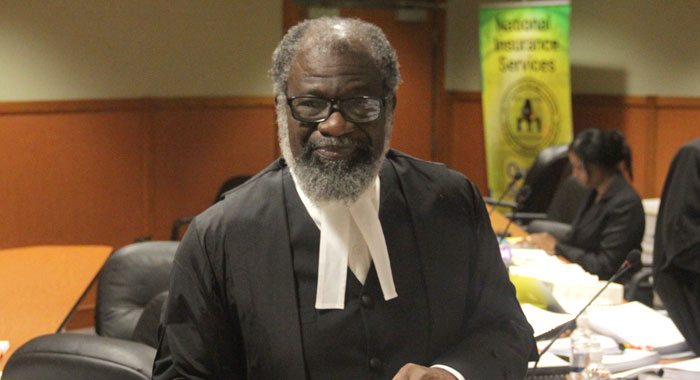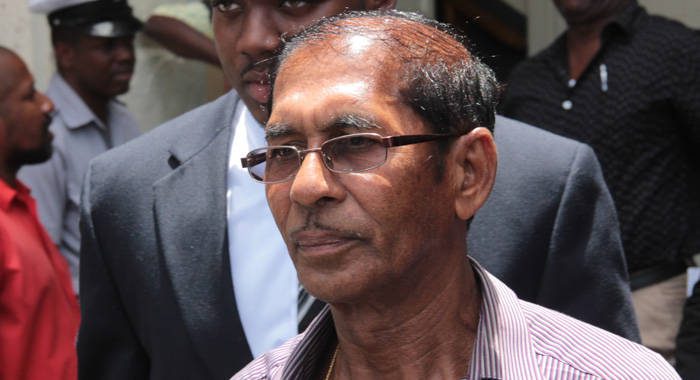Lead counsel for the petitioners Stanley “Stalky” John says that the argument by the respondents’ legal team that Winston Gaymes, the returning officer for Central Leeward in the Dec. 9, 2015 general election, did not have to defend himself, is not of legal merit.
John made the argument, on Thursday, as he responded to closing submissions by Senior Counsel Douglas Mendes, lead lawyer for the respondents, the previous day.
In his closing submission on Wednesday, John had described Gaymes as “a ghost that haunts these proceedings and the critical aspect of these proceedings as we go through them”.
The testimony of several witnesses for the government in the case points back to Gaymes, but the respondents did not call him as a witness in the trial.
Mendes, citing a case in Dominica, said no adverse inference is to be drawn from the fact that Gaymes did not testify.
He said that in the Dominica case, two politicians, including the prime minister, did not testify and offered no evidence in petitions challenging their election on the basis that they allegedly held French passports.
In the Dominica case, the petitioners failed to prove the existence of the alleged French passports and the High Court dismissed the petitions.
The Court of Appeal upheld that decision.
But John told the court that the Dominica case is not applicable in St. Vincent and the Grenadines because there are differences in the laws in both countries.
“My lord, in the first case, the election petition act of Dominica has different provision from the RPA of St. Vincent. The application of the relevant section, … in Dominica, is not on all fours with the provision of sections 59 and 61 of the RPA,” John told the court.
He further stated:

“This matter dealt with specifically what was pleaded in this case and whether or not what was pleaded and whether or not the evidence adduced, based on those pleadings. There was a threshold reached of evidence which required a response from the respondents in that case. It is our respectful submission that such a threshold was reached under our law.”
He further said that the Dominica Evidence Act does not have a provision such as Section 29 of its Vincentian variant.
Section 29 of SVG’s Evidence Act speaks to the admissibility of expert opinion and certain expressions of non-expert opinion.
It says, “(1) Subject to any rules of court, where a person is called as a witness in civil proceedings his opinion on any relevant mater on which he is qualified to give expert evidence shall be admissible evidence.
“(2) Where a person is called as a witness in any civil proceedings, a statement of opinion by him on any relevant matter on which he is not qualified to give expert evidence, if made as a way of conveying relevant facts personally perceived by him, is admissible evidence of what he perceived.
“(3) In this section ‘relevant matter’ includes an issue in the proceedings in question.”
John said:
“My lord can scour all 16, or what have you, pages of it, and it has 32 paragraphs and your lordship will not have a single reference in the Dominica Evidence Act such as 29 [in the SVG evidence act].”
John said that in the Dominica case, the judge found that the petitioners had failed to lead credible evidence that the respondent held a French passport issued to him between the years 2000 and 2002, as he alleged.
He said that to the extent that it has been suggested that the petitioner has no adduced evidence in support of the allegation pleaded that met the threshold which requires the respondents to respond, that that is not, in fact, the case.
The lawyer told the court that it requires careful attention to what was pleaded by the petitioner in relation to the evidence adduced by the petitioner and his witnesses.
Benjamin “Ben” Exeter of the main opposition New Democratic Party (NDP) has brought a petition challenging the announced victory of the ruling Unity Labour Party’s (ULP) Sir Louis Straker in Central Leeward.
The NDP’s Lauron “Sharer” Baptiste is also challenging the announced victory of the ULP’s Montgomery Daniel in North Windward, in the election, which electoral officials say the ULP won by an 8-7 margin for a fourth consecutive term in office.
High Court judge Justice Stanley John is slated to deliver his ruling on March 21.







SSTEEWPPS !!………..STALKY NEEDS TO RETIRE